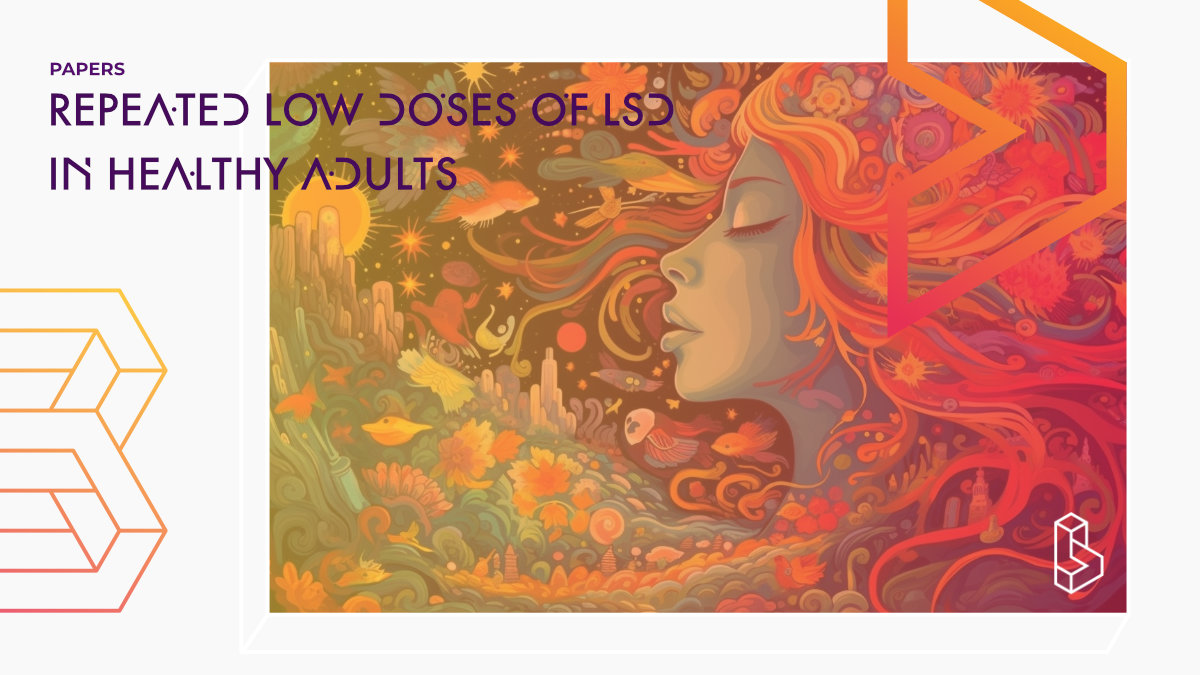This double-blind placebo-controlled microdosing study (n=56) explored the effects of four repeated doses of LSD (13 or 26μg) on measures of mood and cognition. LSD administration sessions were separated by 3-4 days. LSD (26μg) produced modest subjective effects but did not improve mood or affect performance. While LSD was safely administered, low doses of LSD produced negligible changes in mood or cognition in healthy volunteers.
Abstract of Repeated low doses of LSD in healthy adults
“The resurgence of interest in using psychedelic drugs, including lysergic acid diethylamide (LSD), in psychiatry has drawn attention to the medically unsupervised practice of ‘microdosing’. Thousands of users claim that very low doses of LSD, taken at 3–4-day intervals, improve mood and cognitive function., However, few controlled studies have described the effects of the drug when taken in this way. Here, in a double-blind controlled study, we studied the effects of four repeated doses of LSD tartrate (13 or 26 μg) or placebo, administered to healthy adults at 3–4 day intervals, on mood, cognitive performance and responses to emotional tasks. Participants were randomly assigned to one of three drug conditions: placebo (N = 18), 13 μg LSD (N = 19), or 26 μg LSD (N = 19). They attended four 5-hour drug-administration sessions separated by 3–4 days, followed by a drug-free follow-up session 3–4 days after the last session. LSD (26 μg) produced modest subjective effects, including increased ratings of ‘feeling a drug effect’ and both stimulant-like and LSD-like effects, but the drug did not improve mood or affect performance on psychomotor or most emotional tasks. No residual effects were detected on mood or task performance in the drug-free follow-up session. We conclude that within the context of a controlled setting and a limited number of administrations, repeated low doses of LSD are safe but produce negligible changes in mood or cognition in healthy volunteers.”
Authors: Harriet de Wit, Hanna M. Molla, Anya Bershad, Michael Bremmer & Royce Lee
Summary of Repeated low doses of LSD in healthy adults
Microdosing of LSD produces a wide range of beneficial mood and cognitive effects, including improved mental function, increased positive mood, energy level, work effectiveness and ‘healthy habits’, as well as relief from medical conditions such as migraines, pre-menstrual discomfort, traumatic brain injury and shingles.
LSD acts as a direct agonist on serotonin receptors, and also acts on other neurotransmitter systems, including the dopamine system, which has itself been the target of antidepressant drugs such as bupropion. Repeated small doses of LSD and other psychedelic drugs improved deficits in active avoidance learning in animal models. LSD has a long history of use in psychotherapy, with several controlled clinical studies reporting promising effects of moderate to high doses of LSD or psilocybin in the treatment of depression, end-of-life anxiety in terminally ill patients and addictive disorders.
Find this paper
Repeated low doses of LSD in healthy adults: A placebo-controlled, dose–response study
https://doi.org/10.1111/adb.13143
Paywall | Google Scholar | Backup | 🕊
Cite this paper (APA)
de Wit, H., Molla, H. M., Bershad, A., Bremmer, M., & Lee, R. (2022). Repeated low doses of LSD in healthy adults: A placebo‐controlled, dose–response study. Addiction biology, 27(2), e13143.
Study details
Compounds studied
LSD
Topics studied
Microdosing
Study characteristics
Original
Placebo-Controlled
Double-Blind
Randomized
Participants
56
Humans
Authors
Authors associated with this publication with profiles on Blossom
Harriet de WitHarriet de Wit is a Professor of Psychiatry and Behavioral Neuroscience at the University of Chicago. Her research focuses on the physiological, subjective (i.e., mood-altering), and behavioral effects of drugs in healthy human volunteers.
Institutes
Institutes associated with this publication
University of ChicagoResearch with psychedelics is taking place at the Human Behavioral Pharmacology Lab at the University of Chicago.
Compound Details
The psychedelics given at which dose and how many times
LSD 15 - 26μg | 4x
Measures Details
The notable measures taken during this study
LSD 13 μgPersisting Effects Questionnaire
Before (t=0): 1
After (t= 50 minutes): 2
P-value: 0.045
Effect Size: 2.4

